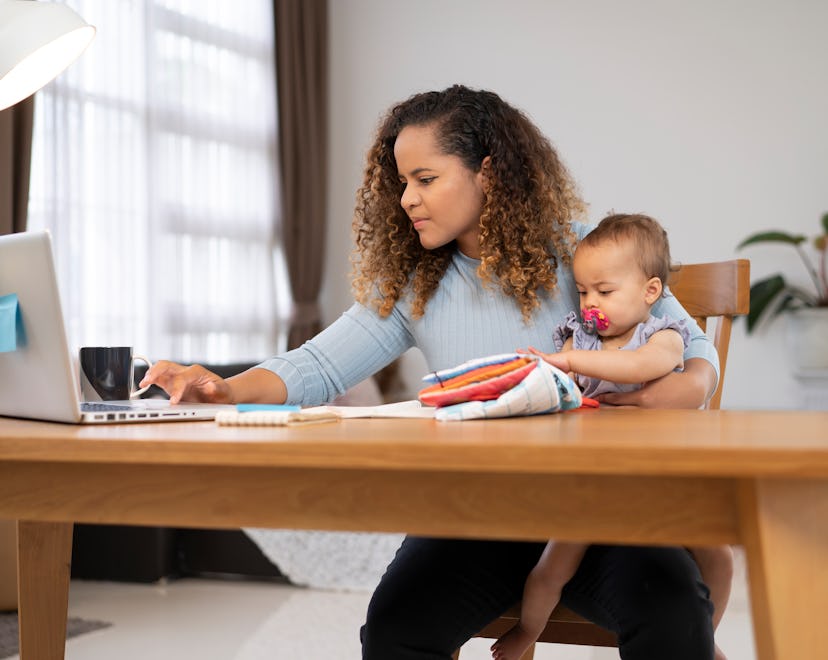News

Remote Work Is "Leveling The Playing Field" For Women's Career Advancement, Report Says
And this flexible professional model seems to be working out for caregivers too.
Working from home definitely has its pros and cons. Sure, it’s great to ditch that long commute, throw your messy hair in a scrunchie, and wear your pajamas to a Zoom meeting. But you also might have to contend with your screaming kids on the other side of that home office door. With obvious benefits and drawbacks, the question remains: Is working remotely actually helping women advance their careers? According to a study by Care.com and Mother Honestly, the answer is a resounding yes. And it looks like remote working is benefitting caregivers, too.
Titled “The Modern Workplace Report,” the study surveyed responses from more than 1,000 employee caregivers and 500 C-Suite level executives or senior level HR managers at companies that had at least 200 employees. The biggest takeaway is that both both men and women agreed that remote work is beneficial for women.
“Given all the hardships mothers have endured during the pandemic, in particular, we were especially excited to see that respondents believe remote work is leveling the playing field for women, with 77% of both men and women agreeing that it has created a more even playing field for career advancement across gender lines,” Blessing Adesiyan, founder of Mother Honestly, and Natalie Mayslich, president of Care.com, wrote in the study’s introduction.
“The Modern Workplace Report” also contained some promising outlooks from caregivers, who understand that one of the most valuable commodities is time. Many parents and caregivers shared that they use the time they are saving on commuting to devote to important personal relationships.
The study found that “88% of employees say they save more than 30 minutes a day by avoiding a commute when working remotely, while 67% save an hour or more. For caregivers, that time is well spent: 73% use it to spend time with their kid, 70% use it to spend time with their partner or spouse, and 63% use it for sleep.”
“The Modern Workplace Report” also suggests that working remotely affects the division of domestic labor in a positive way. “Male and female caregivers report that shifting from in-office to hybrid work impacted their share of household duties fairly similarly,” researchers said of their findings. “All spend more time on caregiving, cleaning and cooking.” It’s also possible that working from home makes housework more visible to both parties. “It’s likely that remote work makes this domestic labor more visible, and gives men more opportunities to tackle it,” researchers said. Nearly 47% of male caregivers with a child under the age of 15 said they spend more time on child care since working from home, saving time for their wives or spouses.
But not everyone is sold on the benefits of working from home. In an op-ed for the Washington Post written by Sian Beilock, president of Barnard College at Columbia University, there are definitely missed opportunities when you miss face time with colleagues. “What is lost when you don’t run into colleagues on the elevator, or when you can’t get to know someone over lunch?” wrote Beilock. “If more men come into the office than women, they will benefit from the deals and relationships that happen organically when colleagues come together.”
Martine Haas, a professor at Wharton, wrote a piece for the Harvard Business Review that discusses the idea of a “double disadvantage” women can face when working remotely. “It’s becoming clear that hybrid work arrangements often create power differences between those who are in and out of the office, and there are good reasons to expect that people who work remotely are likely to be disadvantaged, regardless of their gender,” wrote Haas.
At the end of the day, it’s definitely a good thing for women and parents to have more choices for when and how and where they work. Some moms might thrive at home with a laptop in one hand and a pacifier in the other, and others might need some actual water cooler time and physical separation from their home space.
When it comes to work — whatever works best for each individual family, seems like the right way to go.